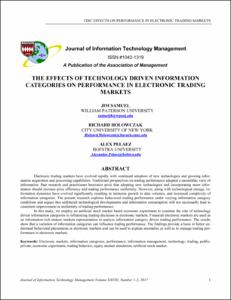Please use this identifier to cite or link to this item:
http://hdl.handle.net/20.500.12164/128| Title: | The Effects of Technology Driven Information Categories on Performance in Electronic Trading Markets |
| Authors: | Samuel, Jim Holowczak, Richard Pelaez, Alex |
| Keywords: | Electronic Markets;Information Categories;Performance;Information Management;Technology;Trading;Public;Private;Economic Experiment;Trading Behavior;Equity Market Simulation;Artificial Stock Market;Business |
| Issue Date: | 2017 |
| Publisher: | University of Baltimore |
| Citation: | Samuel, J., Holowczak, R., & Pelaez, A., (2017). The Effects of Technology Driven Information Categories on Performance in Electronic Trading Markets. Journal of Information Technology Management, 28(1-2). |
| Abstract: | Electronic trading markets have evolved rapidly with continued adoption of new technologies and growing information acquisition and processing capabilities. Traditional perspectives on trading performance adopted a monolithic view of information. Past research and practitioner heuristics posit that adopting new technologies and incorporating more information should increase price efficiency and trading performance uniformity. However, along with technological change, in-formation dynamics have evolved significantly resulting in immense growth in data volumes, and increased complexity of information categories. The present research explores behavioral trading performance under varying information category conditions and argues that unfettered technological developments and information consumption will not necessarily lead to consistent improvement in uniformity of trading performance. In this study, we employ an artificial stock market based economic experiment to examine the role of technology driven information categories in influencing trading decisions in electronic markets. Financial electronic markets are used as an information-rich mature markets representation to analyze information category driven trading performance. The results show that a variation of information categories can influence trading performance. The findings provide a basis to better understand behavioral phenomena in electronic markets and can be used to explain anomalies as well as to manage trading performance in electronic markets. |
| URI: | http://jitm.ubalt.edu/XXVIII-1/article1.pdf http://hdl.handle.net/20.500.12164/128 |
| ISSN: | 1807-1775 |
| Appears in Collections: | Business |
Files in This Item:
| File | Description | Size | Format | |
|---|---|---|---|---|
| Samuel_JournalofInformationTechnologyManagement_v28_no1-2.pdf | Article | 375.12 kB | Adobe PDF |  View/Open |
Items in DSpace are protected by copyright, with all rights reserved, unless otherwise indicated.
